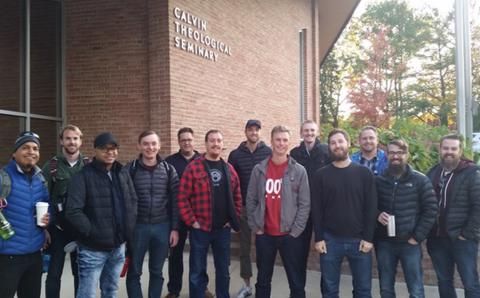It’s a Sunday evening, and my friends Bart and Katie are reading the text. They’re reading from the book I am preaching through—Song of Songs—a sacred text filled with lust and longing:
How beautiful you are, my darling!
Oh, how beautiful!
Your eyes behind your veil are doves. . . .
Your lips are like a scarlet ribbon;
your mouth is lovely. . . .
Your breasts are like two fawns,
like twin fawns of a gazelle
that browse among the lilies. . . .
Awake, north wind,
and come, south wind!
Blow on my garden,
that its fragrance may spread everywhere.
Let my beloved come into his garden
and taste its choice fruits. . . .
Sweat beads on the heads of young boys. Faces are fanned by bulletins. Hearts beat faster. Dopamine surges.
Perhaps the furrowed brow I see on the face of an older gentleman when I begin preaching suggests he came to hear a word from Romans or maybe the Heidelberg Catechism, not Song of Songs.
An erotic dialogue between two teenagers smack dab at the center of our canon? Who makes these kinds of decisions? First-century sage Rabbi Akiva was so convinced of its importance that he said famously, “For all of eternity in its entirety is not as worthy as the day on which Song of Songs was given to Israel, for all the Writings are holy, but Song of Songs is the Holy of Holies.”
Talking about sex is not optional. In fact, it is canonical imperative!
Uncomfortable Conversations
Preaching Song of Songs was one of the most uncomfortable seasons of my pastoral ministry. Awkward giggles rippled through the congregation. Emails arrived, sharing frustration and confusion: “I just don’t think this is appropriate to preach about.” Some didn’t return for the rest of the series. I wrestled with my own inner critic that whispered to me, “Stupid idea, Chuck. Stupid idea.”
And then the real conversations started happening. The 18-year old confessed a pornography addiction. A young high school couple told me they’d been having sex and feeling great shame. An older couple began to talk about decades-long patterns of avoidance and sexual anorexia. Several young women named abuse in their stories. We even opened up new categories of spiritual engagement with God through the historic musings of Bernard of Clairvaux, John of the Cross, even the Presbyterian pastor Samuel Rutherford—the so-called “bridal mystics” whose spirituality was deeply interwoven with the sensual imagination of Song of Songs.
It’s perhaps more comfortable to take sermon notes from Luke or Galatians than to hear the desire of teenage lovers in language ordinarily reserved for the bedroom. But we need to talk. The church needs to talk. And we need to talk about us—not them, not those people, not about selling wedding cakes to gay couples or about the transgender student at school. Sure, these conversations are important, but it’s far easier to talk theoretically about other people than it is to engage our own sexual complexity and pain. Maybe those people are, in fact, us.
I get invitations regularly to help churches process issues of LGBTQ inclusion. I’m grateful that churches want to engage an important conversation and I wish more would. But whenever I get these invitations, I begin by asking how the church engages sexuality in general. Most of the time I get a blank stare, or a long pause, or “We’re really not doing much at all.”
Has your church engaged in a conversation about single sexuality? Is it a safe haven for those who’ve been sexually abused or assaulted? Is the pervasive epidemic of pornography addiction being attended to? Is the church actively working on marriages when divorce rates in evangelical churches outnumber the unchurched, according to Baylor University’s Council on Contemporary Families? Have you faced destructive legacies of misogyny couched in theological language around gender roles?
What saddens me is that many find community and empathy outside of the church. The church, in fact, feels like the last place to engage one’s story of sexual abuse or confess an addiction, to share about a loveless marriage or name loneliness. While our liturgies invite belonging, confession, reminders of baptismal identity, forgiveness, and a table of grace set by Jesus for us, our posture can be distant, cold, and prudish. What keeps us from engaging? What are we scared of?
Where Are You?
God’s very first question in Scripture is a penetrating one: Where are you? Into our fear and shame, God calls out. God searches longingly as we hide.
We hide and numb in a thousand ways—in busyness or drink, in work or spiritual platitudes. We immerse ourselves in a different drama—the drama of football or The Bachelor or neighborhood gossip—to avoid our own inner drama. It’s easier to dip into the titillating romance of a television couple than dive into the barrenness of intimacy in our own lives.
It’s also easy to get mad at others, to scapegoat. We externalize our problems—we put them “out there” or on others. We blame “secular culture,” that gay couple down the block, the woman who sleeps with all the guys at work, or the liberal pastor who posts inclusive messages on Facebook. Hiding and scapegoating—this is as old as Genesis 3. And it’s our story today. Every day. Each and every one of us has a story. Are we mining the depths of our hearts, inviting God to know us in our depths? Or are we too concerned with the story of someone else?
Sometimes we needed to be reminded of the wisdom of old friends like C. S. Lewis, who said, “Every man should keep a fair-sized cemetery in which to bury the faults of his friends." Or the 19th-century urban preacher Charles Spurgeon, who wrote, “It is always easier for us to want to purify other people and attempt a moral reformation among our neighbors. (Yet) how much have I helped to make her what she is?”
Where are you? How are you hiding? How does your church contribute to a culture of fear, shame, and untold secrets?
I’ve had the sacred privilege as a pastor, professor, and therapist to listen to hundreds and hundreds of stories over some 20 years or more of ministry. I’ve met some really courageous people who’ve experienced God’s “Where are you?” They are women and men who invited the Spirit into their complexity and confusion, refusing to numb the ache or kill the longing.
A single woman in her 30s who longs to be married wrestles with unfulfilled desire. She tells me that she could have settled several times—for abusive men, for a guy who’d provide for a good life but who isn’t able to connect, for someone less emotionally and spiritually mature. But she doesn’t. Yet her soul craves connection. Her being craves sexual intimacy. She isn’t willing to cut off desire. She’s a Christian, after all, whose tradition ennobles her desire for sex and connection as creationally good. Are her questions and longings welcome in the church?
A young pastor is caught looking at same-sex pornography. Being found out feels like a relief, as his pattern of hiding has led to lies and disconnection from his wife. He begins a scary conversation with his therapist about his sexual confusion, naming truths he never dared name in premarital counseling or in seminary. Though an elder calls him a “pervert” who should never step into a pulpit again, the young pastor goes on the courageous journey to explore his story as his wife also discovers unexplored pain in her own life she had never faced. Can the church walk alongside this couple?
A married woman in her 60s isn’t willing to settle anymore. Her husband belittles her. Though he’s a beloved coach and teacher at their Christian school, he’s a bully at home. He forces her to have sex. The words “I don’t deserve this” come out painfully; she says she feels selfish saying them. Years of church teaching on her sinful depravity have convinced her that guilt and shame and unhappiness is her burden to bear. And yet something within isn’t willing to accept this anymore. She’s beginning to believe God delights in her, longs for her joy and glory, and smiles on her. After many tries and multiple refusals by her husband to go to counseling, she greets him at the door one evening, handing him the keys to the house and a note with her new address. God delights in me, she remembers, even as he hurls insults at her as she walks off. Is her story too messy for the church?
Mature Conversations
I sometimes wonder: Is it possible for us to engage messy and complex conversations around sex, abuse, addiction, misogyny, homosexuality, and more? Are we capable of having mature conversations apart from Facebook skirmishes? Sometimes I wonder. But then I have an experience like the one I had just a few years ago, and I’m reminded once again of how beautiful the church can be.
On a wintry afternoon, I sit in a gathering with people who disagree on many things—so-called progressives and conservatives. They are sharing stories with one another. It’s not an academic debate. They’re not arguing about the meaning of Bible verses. They are simply listening and storytelling.
I sit with a man, likely in his 50s—a tall Dutch drink of water with an etched jaw and leathery hands. He’s a longtime elder in the Christian Reformed Church. He leans in to listen to a young gay man who, through tears, tells of growing up hearing that people like him are hell-bound. The elder, a theologically astute man, asks questions. What was it like to go to church? How did you tell your parents? How did it feel to hold this secret for so long? How does it feel telling me your story? The brave young man all the while knows that he is sharing his story with a very conservative brother in Christ.
After some time, the elder shares his own experience. He talks about his story—how deeply he values God’s Word and the gift of trusted teachers who taught him the Bible. He softens as he shares about decades in a loveless marriage, many of those years spent in separate bedrooms. Through tears he talks about a breakthrough: He came to terms with his fear of intimacy, his shame, his abuse, how he hurt his wife. Both men are now in tears.
There is no magical moment of theological agreement. The young man expresses his desire to be married to another man. The older man is quiet at first. He then tells his young friend that this is hard for him to hear, given his convictions, but that he’s glad the young man can say it. He doesn’t try to fix the young man. He doesn’t suggest a therapist. He doesn’t quote a verse. He stands in his truth, but with empathy for a fellow sojourner. I suspect he can do this because he has navigated many personal battles at some cost, and platitudes don’t often help.
They’ve connected as human beings, these two men, with precious stories and profound pain. Empathy abounds. The weathered elder says, “Listen closely . . . if you ever come through my town and want to go to church, you come, you sit right next to me, and we will worship together.” And then he leans in, placing his hand on the young man’s shoulder, calling upon the Heidelberg Catechism for comfort: “Son, you belong.
You belong, body and soul, to your faithful savior Jesus, to the church. Never forget that.”
We’re all in tears. It’s a picture of spiritual maturity I will not soon forget.
We need to talk. We need to talk about sex and intimacy, about shame and loneliness, about addiction and assault. Our teenagers need to talk. Our singles need to talk. Those in lifeless marriages need to talk. We cannot afford to demonize, scapegoat, or avoid any longer. We need our conversations to be wise and mature.
If the church cannot host the complexity of this hard conversation, then it cannot honor the breadth of its sacred canon, with stories of rape and misogyny, adultery and addiction, oppression and abandonment, with an erotic love poem right smack dab in the middle of it.
There is no how-to. I can’t point you to a surefire curriculum. I have some thoughts on how the church can engage, and some personal experiences of doing it as a pastor. I can tell you this: It begins with courage, perhaps the courage to explore your own story first. And it is seasoned with Christ-like empathy.
I didn’t know what I was getting myself into when I preached Song of Songs. I’d rather be comfortable, and I wasn’t. But as the sacred text does, it gave us room, even permission, to talk. Thanks be to God.
About the Author
Chuck DeGroat, associate professor of pastoral care and counseling at Western Theological Seminary in Holland, Mich., is the author of Leaving Egypt (Faith Alive) and Toughest People to Love (Eerdmans).









